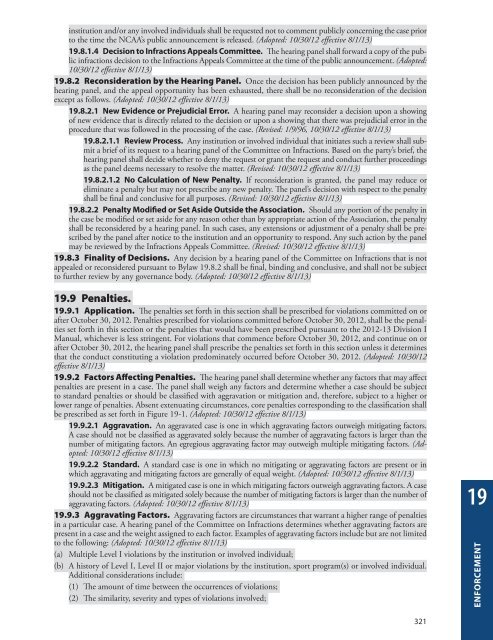ncaa-manual
ncaa-manual
ncaa-manual
- No tags were found...
You also want an ePaper? Increase the reach of your titles
YUMPU automatically turns print PDFs into web optimized ePapers that Google loves.
institution and/or any involved individuals shall be requested not to comment publicly concerning the case priorto the time the NCAA’s public announcement is released. (Adopted: 10/30/12 effective 8/1/13)19.8.1.4 Decision to Infractions Appeals Committee. The hearing panel shall forward a copy of the publicinfractions decision to the Infractions Appeals Committee at the time of the public announcement. (Adopted:10/30/12 effective 8/1/13)19.8.2 Reconsideration by the Hearing Panel. Once the decision has been publicly announced by thehearing panel, and the appeal opportunity has been exhausted, there shall be no reconsideration of the decisionexcept as follows. (Adopted: 10/30/12 effective 8/1/13)19.8.2.1 New Evidence or Prejudicial Error. A hearing panel may reconsider a decision upon a showingof new evidence that is directly related to the decision or upon a showing that there was prejudicial error in theprocedure that was followed in the processing of the case. (Revised: 1/9/96, 10/30/12 effective 8/1/13)19.8.2.1.1 Review Process. Any institution or involved individual that initiates such a review shall submita brief of its request to a hearing panel of the Committee on Infractions. Based on the party’s brief, thehearing panel shall decide whether to deny the request or grant the request and conduct further proceedingsas the panel deems necessary to resolve the matter. (Revised: 10/30/12 effective 8/1/13)19.8.2.1.2 No Calculation of New Penalty. If reconsideration is granted, the panel may reduce oreliminate a penalty but may not prescribe any new penalty. The panel’s decision with respect to the penaltyshall be final and conclusive for all purposes. (Revised: 10/30/12 effective 8/1/13)19.8.2.2 Penalty Modified or Set Aside Outside the Association. Should any portion of the penalty inthe case be modified or set aside for any reason other than by appropriate action of the Association, the penaltyshall be reconsidered by a hearing panel. In such cases, any extensions or adjustment of a penalty shall be prescribedby the panel after notice to the institution and an opportunity to respond. Any such action by the panelmay be reviewed by the Infractions Appeals Committee. (Revised: 10/30/12 effective 8/1/13)19.8.3 Finality of Decisions. Any decision by a hearing panel of the Committee on Infractions that is notappealed or reconsidered pursuant to Bylaw 19.8.2 shall be final, binding and conclusive, and shall not be subjectto further review by any governance body. (Adopted: 10/30/12 effective 8/1/13)19.9 Penalties.19.9.1 Application. The penalties set forth in this section shall be prescribed for violations committed on orafter October 30, 2012. Penalties prescribed for violations committed before October 30, 2012, shall be the penaltiesset forth in this section or the penalties that would have been prescribed pursuant to the 2012-13 Division IManual, whichever is less stringent. For violations that commence before October 30, 2012, and continue on orafter October 30, 2012, the hearing panel shall prescribe the penalties set forth in this section unless it determinesthat the conduct constituting a violation predominately occurred before October 30, 2012. (Adopted: 10/30/12effective 8/1/13)19.9.2 Factors Affecting Penalties. The hearing panel shall determine whether any factors that may affectpenalties are present in a case. The panel shall weigh any factors and determine whether a case should be subjectto standard penalties or should be classified with aggravation or mitigation and, therefore, subject to a higher orlower range of penalties. Absent extenuating circumstances, core penalties corresponding to the classification shallbe prescribed as set forth in Figure 19-1. (Adopted: 10/30/12 effective 8/1/13)19.9.2.1 Aggravation. An aggravated case is one in which aggravating factors outweigh mitigating factors.A case should not be classified as aggravated solely because the number of aggravating factors is larger than thenumber of mitigating factors. An egregious aggravating factor may outweigh multiple mitigating factors. (Adopted:10/30/12 effective 8/1/13)19.9.2.2 Standard. A standard case is one in which no mitigating or aggravating factors are present or inwhich aggravating and mitigating factors are generally of equal weight. (Adopted: 10/30/12 effective 8/1/13)19.9.2.3 Mitigation. A mitigated case is one in which mitigating factors outweigh aggravating factors. A caseshould not be classified as mitigated solely because the number of mitigating factors is larger than the number ofaggravating factors. (Adopted: 10/30/12 effective 8/1/13)19.9.3 Aggravating Factors. Aggravating factors are circumstances that warrant a higher range of penaltiesin a particular case. A hearing panel of the Committee on Infractions determines whether aggravating factors arepresent in a case and the weight assigned to each factor. Examples of aggravating factors include but are not limitedto the following: (Adopted: 10/30/12 effective 8/1/13)(a) Multiple Level I violations by the institution or involved individual;(b) A history of Level I, Level II or major violations by the institution, sport program(s) or involved individual.Additional considerations include:(1) The amount of time between the occurrences of violations;(2) The similarity, severity and types of violations involved;19Enforcement321


